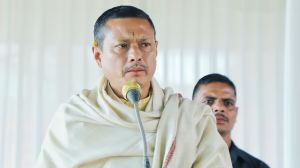Standards are uneven but we have very good doctors and procedures in India
Eminent <B><font color"#cc000">cardiologist Dr Naresh Trehan</font></B> was at the Express for an Idea Exchange. In this session moderated by <B><font color"#cc000">special correspondent Toufiq Rashid</font></B>,Trehan speaks about his Medicity project,medical research in India and accountability among doctors...
•COOMI KAPOOR: Tell us about Medicity and why you felt it so important to set up an institution of its kind?
I was in the US for 20 years and many Indians came to New York for their surgeries,spending ten times the money and leaving their families behind. We were not able to provide cardiac services in India. Thats when I decided to come back to India and build Escorts Heart Institute with Mr Hari Nanda. We built it into one of the largest heart institutes in the world. In India,we have been blindly following research and developments in the West. We dont have the data,we dont have the means to collect the data and analyse it properly to see whether there are alternatives for a population like ours. I realised there is no hope for our country if we follow others blindfold. Thats when I felt it was important to start the process of our own therapies,our own research,our own diagnostics. At the same time,if there are therapies or synergies available in traditional medicine such as ayurveda,ayurpathy,unani which we are able to successfully amalgamate with modern medicine,then we might come up with better therapies which are less invasive to the human body,equally effective and maybe cost one third the price. Medicity was formed with this idea in mind.
•SONAL VIJ: How do you plan to provide affordable healthcare?
Its a mindset. In all the years that I was at Escorts,we never advertised the hospital. Still,we went from 150 beds to 330 beds and every day we had to turn back 20-30 patients. They felt if they came to this hospital they would get honest,cutting-edge treatment at a cost which was declared,not hidden. That enabled us to get Rs 12 crore worth of equipment and I built five hospitals in three years. Now we are planning to give 5 per cent of our services free and incrementally provide 6,000 villages with 24×7 telemedicine. The idea of Medicity is,if you reach Medicity you will be treated.
•TOUFIQ RASHID: Now that Medicity is launched,will you still be attached to Apollo Hospital?
We are trying to work out something. Obviously,I cant divide my time between them but we will have some presence of doctors at Apollo.
•COOMI KAPOOR: How do hospitals and doctors in India compare with those in the west?
The standards in India are uneven but there are some very,very good doctors and good procedures here. What we lack are systems. One of the first patients who came to me from the US said that while he talked to me on the phone,he was very comfortable about coming here. But from the airport to the hospital,he felt he had made a mistake. Once he walked into the hospital,he felt good again. It is the Indian paradox and it applies to us also: there are some very good standards and some poor standards.
•COOMI KAPOOR: Will Medicity look at stem cell research? It is being called the future medicine?
We have been doing a lot of work on the heart,the problems we are facing is of Government policy,the presence of it or lack of it. Singapore allows unrelated donors for transplants,thats why you see so many of our politicians there right now. Thailands hospitals are at a leading edge of medical tourism and they have no regulations. If you see the quality of work we are doing for stem cell,we are almost ahead of anybody else.
•TOUFIQ RASHID: But arent there a lot of ethical issues?
Stem cells can be described as the maintenance department of our bodyit repairs any damage. If there is damage on a large scale,it overwhelms our defence system. As we grow older,stem cells also lose their efficiency. For example,if I have heart attack,the heart has become weak and my cells are not able to cope with it. But if we take a higher concentration of cells,collectively can they do the job? Thats the theory we are working on: we take out a whole bunch of them from the bone marrowwhich has a high concentration of stem cellswe process them and then inject them directly into the tissue. Thats what we have been doing in the heart and after one year,the results have been very good. The next step is,if I could get a million cells from your body and if I made them into ten million cells,will that work even better for you? Thats called cell expansion. Thats the other thing which is happening. Then suppose your own body is only able to repair so much of an organ. What if I took cells from a foetusthe cells of that will divide into every organ of the bodyculture them and inject them into a damaged area,say the brain,will they adapt themselves to that nervous tissue? If they do,then we have really won the battle. The puzzle that still remains is that we put them in and dont know what organ they may create. Worse,can they grow into cancer cells? If so,how do we switch them off once they start multiplying?
•LEHER KALA: What is the maximum number of surgeries you have performed in a day and when something goes wrong in a surgery,how do you deal with it?
The maximum number of cases for me at Escorts was between 18-20 in a day. When a mistake is made,one has to ascertain the nature of the mistake. If you operate on the wrong part of the brainthat is absolute negligence. If you did not pay attention,thats negligence. If something goes wrong due to the carelessness of the doctors or any of the team members,that is negligence. If something goes wrong and there is a cover up,then that is also negligence. If it happens as an accident or as part of the procedure,that does not fall in the realm of negligence.
•LEHER KALA: How should doctors be held accountable? In the US,one can sue doctors and they have to pay the damages.
We should be accountable. There is a consumer forum,so we have to face it. But the due process of discovery of negligence or lack of it is very important. Then the appropriate punishment must be given. But sometimes,or most of the time,there is no negligence. Somebody dies. That does not mean the doctor gave him the wrong medicine. In our society,it is very difficult to accept that something bad happened without blaming somebody. Remember,the doctor doesnt give the disease.
At Medicity,there are three tenets which I am trying to promote: that you should have a more transparently governing structure. Secondly,the outcomes should be transparent: if I tell a patient there is a half per cent risk in surgery; it should actually be half per cent. We are going to post on our website the outcomes of each procedure so that people know what it means. Third is to have the most transparent billing system. I tell the doctors that if a person is treated by you,he should leave the hospital with the taxi fare in his pocket,dont take his pants off. Also,if a family loses someone then they should still want to thank you. If you can achieve that,you are true to your profession.
•ANINDITA SANYAL: Barring the general hospitalisation costs,heart surgery can set you back by Rs 1.5 lakh. How can we bring that cost down?
If you want good quality hospitals,where you dont get infections,where you have a controlled environmentthat it is an expensive proposition.
•ANINDITA SANYAL: Even the placing of a simple stent is extremely costly.
Thats because Johnson and Johnson,who makes them,refuses to sell a stent below Rs 90,000. Now they have come out with a new one which will cost Rs 1.5 lakh. We are captive to these companies and in India,it does a huge amount of damage as a large number of stents will close. Our results are much worse with stents as compared to the West. So we need to do our own studies. We should have a Rs 10,000-15,000 stent which does not fail. Indian stents are being made but they havent achieved freedom from problems as yet.
•UNNI RAJEN SHANKER: How do we make affordable healthcare accessible to the rural population?
You have to layer it. We know that on paper,there is a primary health care centre every five villages. But what if it is a shack,there are no doctors or medicines left there? But if we cannot provide healthcare to all,we should at least decrease disease. In the villages,50-70 per cent of diseases are preventable because they are related to water,sewage,garbage,mosquitoes and lack of education. Three years ago,we took up a village behind a corporate plant. We found the drinking water to be very brackish. The sewage was free flowing and flowed into the low lying areas,including to the pump from which people draw their drinking water. There was no garbage disposal. In the school,there was 100 per cent drop out of girls as there were no toilets for them. We took it up as a pilot project with the corporate sponsoring it for Rs 12 lakh. We provided clean drinking water,made sewage channels,dug dry septic pits and built toilets. Four months later,there was a 70 per cent reduction in diseases. There is also the ASHA programme,a scheme launched by the government that involves NGOs to strengthen the programme. What we should do is to take a hospital in a district and through the public-private partnership,vitalise the hospital. Mobile medical vans can cover 200 km a day. Every village does not need a 24-hr dispensary because every other day,the medical team could go out,cover its territory in a cost effective manner through vans. We cant have 100 doctors posted in a village but we can have one doctor who could cover 100 villages. Doctors wont stay in a village because no doctor would stay without his family. Also,there arent enough doctors to stay in villages. The total population of registered doctors in India is 5,000 and not all of them are MBBS.
•SHRAVAN SEN: How can health insurance be popularised?
The basic tenet is that people will have to learn to be honest. Today,an insurance company issues a policy to somebody who already knows he has to undergo an operation. He will get it done and he will ask the doctor not to mention he had high blood pressure for the last 20 years. Then,the people at the insurance company will ask the patient for Rs 10,000 to get his bills passed. This is a vicious cycle and insurance companies lose 30-40 per cent of the money because of false claims. I believe that health insurance gradually will take hold if you distribute it over a large population. Blanket insurance can negate higher costs.
•MINI KAPOOR: A lot of activists are asking for a ban on homeopathy,especially in UK. Do you think we need stricter norms to govern alternative therapies?
More dangerous than homeopathy is ayurveda because of the way it is practised. The use of heavy metal leads to toxicity. Regulation should be done because 80 per cent of healthcare spending comes from private bodies or pockets. When my household help get a fever,they will get an injection from the neighbourhood quack. They think I am a quack and hes a real doctor because I dont give injections for every little headache. The government must step in and validate alternative therapies. Ayurveda is not even regulated: you can just make a drug and put it on the market.
•MANU PUBBY: The cost of medicines is quite high. There is a lot of talk about the nexus between pharmaceutical companies and doctors.
I dont think a doctor looks at a medicine and says,let me prescribe this because I am going to get a kickback. You can regulate the pharmaceuticals companies because they are into creating jaunts for doctorslike a star cruise from Singapore and a lecture on diabetes for 15 minutes onboard. These things are very difficult to regulate. USA has come down very hard on it. If a doctor is found to have taken favours from medical companies,they will put him in jail first and then take away his license. We are far away from this but there are more serious ills we have to fix in medicine. One of the things is that at every stage,there has been some violation of our Hippocratic Oath. Take the issue of doctors doing sex determination,or getting insurance for a patient through a false declaration.
•SHARON FERNANDES: What can a patient look forward to from a doctor in case of medical malpractises?
When doctors were going to be included within the ambit of the Consumer Protection Act,I had objections to it. I said that on one hand,accountability is very necessarypeople are trusting you with their lives. On the other hand,having accepted accountability,how do you go about it without disrupting the system? I said this should not be named Consumer Protection Act,it should be Professional Practices Act so that everybody comes under itlawyers,architects,etc. Why do you wish to destroy the doctors to this level? If you call them cheats,corrupt and traitors,they will start cheating because you have already condemned them. It will be much better if we have a Professional Practices Act and review panel. Those will bring down the mental torture that families go through.
Transcribed by Richa Bhatia



- 01
- 02
- 03
- 04
- 05




























